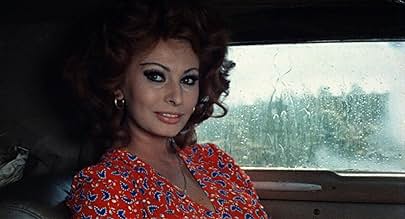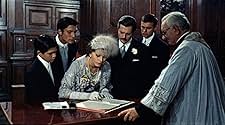Wealthy businessman Domenico and penniless prostitute Filumena share a large part of their lives in post-WWII Italy.Wealthy businessman Domenico and penniless prostitute Filumena share a large part of their lives in post-WWII Italy.Wealthy businessman Domenico and penniless prostitute Filumena share a large part of their lives in post-WWII Italy.
- Nominated for 2 Oscars
- 7 wins & 10 nominations total
Marilù Tolo
- Diana
- (as Marilu' Tolo)
Alberto Castaldi
- Doctor
- (as Alberto Gastaldi)
Vincenzo Aita
- Alfonso, Priest
- (uncredited)
Storyline
Did you know
- TriviaDomenico arranges an apartment in Naples for Filumena. The former tenant's belongings are still in. There is a picture of Clara Petacci ( = dictator Mussolini's mistress) on the wall and Filumena asks when is this going to be removed. The scene is set to late 1940's, so this obviously symbolizes Italy's transition from fascism to a republic. Mussolini himself would probably not have passed the censors.
- Quotes
Filumena Marturano: [subtitled version] The problem is that our hearts used to be so big...
[holds up pebble]
Filumena Marturano: and now look how small they are.
- ConnectionsEdited into Marcello, una vita dolce (2006)
- SoundtracksMunasterio 'e Santa Chiara
(uncredited)
Written by Michele Galdieri and Alberto Barberis
Sung by Don Domenico on the trip home from the racecourse; Don Domencio also asks the boys to sing it
Featured review
One of the biggest hits of the "Italian Comedy", starred by the top of the Italian star-system. De Sica give us a solid film all along the length, taking us from drama to comedy, they're separated by a faint border; as the life itself.
Obviously, the time has passed and some points are old-fashioned (technical resources, technology, life's perspective) but it's true the film gets one realistic approach (it couldn't be less being this film one of the examples of Italian neo-realism) about the drama of a woman who looks for dignity and fights for the good of her children.
This pink neo-realism sows us the common life of Italian people after WWII. Mediterranian country, misogyny, catholic, conservator, noisy similar to Spain (españolada, Landismo), Greece, etc.
Good performances form Mastroianni, who is a playboy but with a good heart at least, and, especially Sophia Loren, at her prime, as Filomena, a prostitute who will fight for her honesty, dignity and her sons, a woman with attitude, tough in her acts and with some real curves. In other words the best "donna", along with Magnani, in all history.
De Sica, without reaching the lever of previous works in the 40's, makes a gret work in a field he controls like only a few people more. Good photography and ambiance. Music as Italian music, little cloying but it don't bother and it suits the film.
Thou, there are some negative points: - Relationship with children and their reaction are unnatural and the aren't worked as it'd be necessary. - Story could be analyzed in a deeper way. It's a good topic. - Make-up of Loren at 17, she doesn't look even for a moment, her body is different, no one can't do it something about it with that clothes, but the make-up could be better.
But it's a good movie, despise of these thing and the fact that is a movie made in the early 60's and other things I can't remember. You can enjoy this film and discover if you didn't make it earlier the refreshing Italian cinema.
Obviously, the time has passed and some points are old-fashioned (technical resources, technology, life's perspective) but it's true the film gets one realistic approach (it couldn't be less being this film one of the examples of Italian neo-realism) about the drama of a woman who looks for dignity and fights for the good of her children.
This pink neo-realism sows us the common life of Italian people after WWII. Mediterranian country, misogyny, catholic, conservator, noisy similar to Spain (españolada, Landismo), Greece, etc.
Good performances form Mastroianni, who is a playboy but with a good heart at least, and, especially Sophia Loren, at her prime, as Filomena, a prostitute who will fight for her honesty, dignity and her sons, a woman with attitude, tough in her acts and with some real curves. In other words the best "donna", along with Magnani, in all history.
De Sica, without reaching the lever of previous works in the 40's, makes a gret work in a field he controls like only a few people more. Good photography and ambiance. Music as Italian music, little cloying but it don't bother and it suits the film.
Thou, there are some negative points: - Relationship with children and their reaction are unnatural and the aren't worked as it'd be necessary. - Story could be analyzed in a deeper way. It's a good topic. - Make-up of Loren at 17, she doesn't look even for a moment, her body is different, no one can't do it something about it with that clothes, but the make-up could be better.
But it's a good movie, despise of these thing and the fact that is a movie made in the early 60's and other things I can't remember. You can enjoy this film and discover if you didn't make it earlier the refreshing Italian cinema.
- dirkdeckard
- Oct 3, 2012
- Permalink
- How long is Marriage Italian Style?Powered by Alexa
Details
Box office
- Gross US & Canada
- $10,600
- Opening weekend US & Canada
- $4,967
- Sep 25, 2011
- Gross worldwide
- $157,819
- Runtime1 hour 42 minutes
- Sound mix
- Aspect ratio
- 1.85 : 1
Contribute to this page
Suggest an edit or add missing content

Top Gap
By what name was Matrimonio all'italiana (1964) officially released in Canada in French?
Answer




























